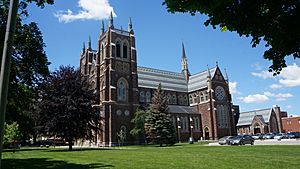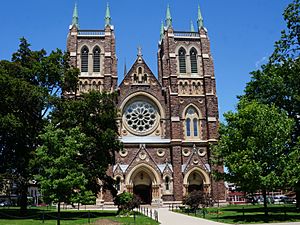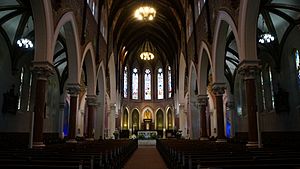St. Peter's Cathedral Basilica (London, Ontario) facts for kids
Quick facts for kids St. Peter's Cathedral Basilica |
|
|---|---|

St. Peter's Cathedral Basilica
|
|
| 42°59′13″N 81°15′0″W / 42.98694°N 81.25000°W | |
| Location | 196 Dufferin Avenue London, Ontario N6A 1K8 |
| Denomination | Roman Catholic |
| Website | St. Peter's Website |
| History | |
| Status | Cathedral, minor basilica |
| Administration | |
| Parish | St. Peter's |
| Deanery | London |
| Diocese | London |
St. Peter's Cathedral Basilica is a very important church located at 196 Dufferin Avenue in London, Ontario, Canada. It belongs to the Roman Catholic faith and serves as the main church for the Diocese of London. It is known as both a cathedral and a minor basilica, which means it has a special status given by the Pope.
Contents
How St. Peter's Cathedral Began
The community that would become St. Peter's started on August 10, 1834. The very first church was a simple building made of logs. It was located at the corner of Dufferin Avenue and Richmond Street. Before this, a traveling priest would visit the area to hold religious services for Catholic families.
This first church was named after St. Lawrence. It could hold about 180 people. Sadly, it was destroyed in a big fire that swept through London on April 11, 1845.
Rebuilding After Fires
After the first church burned down, a new one was quickly built. This one was made of wood, with materials and help donated by the community. But this church also burned down in August 1850.
A third church, also called St. Lawrence, was then built. This time, it was made of brick. It stood near where the current church is today. The land for this church was given by the Crown to Bishop Alexander Macdonell. The first stone for this new brick church was laid on June 29, 1851. This date is special because it is the Feast of Sts. Peter and Paul.
Becoming a Cathedral
In 1856, the Diocese of London was officially created. A diocese is a large area managed by a bishop. Bishop Pierre-Adolphe Pinsoneault chose the St. Lawrence church to be his main church, or cathedral. He renamed it St. Peter's.
For a short time, in 1859, Bishop Pinsoneault moved the main church to Windsor. But in 1868, the next bishop, John Walsh, moved it back to London.
Building the Grand Cathedral
Bishop Walsh believed the diocese needed a truly grand cathedral. He chose Joseph Connolly as the architect. Construction began in July 1880. The church was built in a beautiful style called French Gothic Revival. This style looks like the grand cathedrals built in France in the 13th century.
The main building was finished between 1880 and 1885. It was officially dedicated on June 28, 1885. The first stained glass windows were added in 1889. However, the inside decoration wasn't fully completed until 1926. A large pipe organ made by Casavant was also installed that year.
Modern Changes and Special Status
Many years later, in 1958, more parts were added to the cathedral. The two tall towers at the front were completed. A special chapel called the Lady Chapel and a sacristy (a room where priests prepare for services) were also built. More stained glass windows were put in, and the inside was painted and decorated further.
On December 13, 1961, Pope John XXIII gave St. Peter's a very special honor. He raised it to the status of a minor basilica. This means it is a church of special importance to the Pope and the Catholic Church.
In 1968, the inside of the Cathedral Basilica was updated. The old main altar and communion rails were removed. A new marble altar was installed. The cathedra, which is the bishop's special chair, was moved to behind the altar. These changes made the sanctuary (the area around the altar) much larger.
The current bishop of the Diocese of London is the Most Reverend Ronald Fabbro.
Images for kids
See also
 In Spanish: Catedral basílica de San Pedro (London) para niños
In Spanish: Catedral basílica de San Pedro (London) para niños
- Cathedral
- Minor basilica
 | Roy Wilkins |
 | John Lewis |
 | Linda Carol Brown |






